More officers of color, local focus. Caldwell police want to build ‘trust of the badge’
Oscar Martinez grew up in Santa Ana, a gentrifying city in Southern California near Anaheim, where his single mother supported three children.
Martinez lived in poverty and was surrounded by violence and drugs, he said. He and his two sisters often spent nights in their car to find shelter away from the violence his stepfather inflicted on his mother.
It was his dream to become a police officer, he said, but he never saw that becoming a reality. His family had negative experiences with police officers, as many Latinos do. But eventually, Martinez decided he wanted to be a support system to people, like his family, who don’t trust the police.
“That’s the reason why I’m here, because I want to help out, I want to make a difference,” Martinez said in an interview with the Idaho Statesman. “I want to be a support system for those people that are not being heard.”
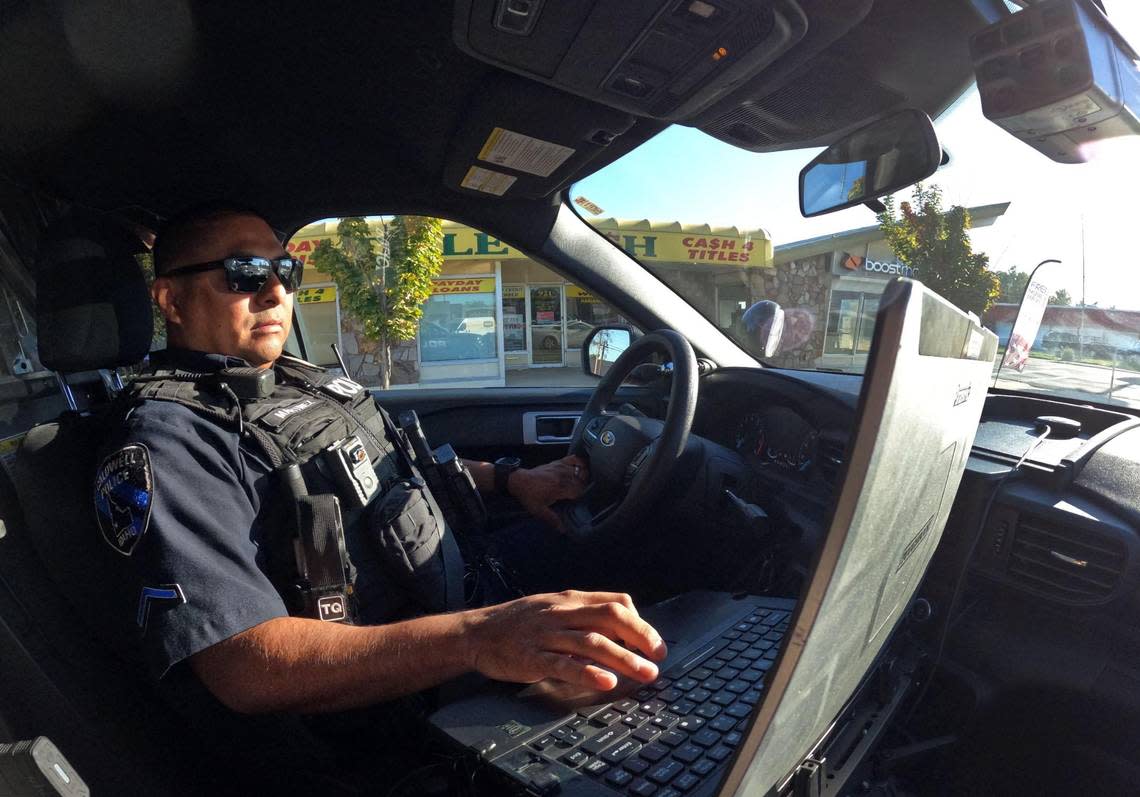
Martinez is one of nine Latino officers in the Caldwell Police Department, which patrols a city that is 36% Latino. But Caldwell’s police force is only 14% Latino, according to data from the department.
Police Chief Rex Ingram, who joined the department in July, told the Statesman that he is trying to “bridge the gap” between the Latino community and the overwhelmingly white force.
Ingram, who is partially Hispanic, said in an August interview that the department is working to hire more officers of color and who speak Spanish. But Ingram said the community first needs to trust the department.
“You have to hire from the community, and you have to bring in folks that are from your community that look like you and you look like them,” Ingram said.
Caldwell police spokesperson Char Jackson said by email that Caldwell has 12 vacancies, 11 of which are for officers.
Last week, the Caldwell Police Department officially swore in four new officers — all of them are people of color.
Many Latinos slow to trust law enforcement
Nationwide, many Latinos trust the police less than non-Latinos. According to a survey by the Cato Institute, 78% of non-Hispanics say they would definitely report a crime, compared with 57% of Hispanics.
Margie Gonzalez, executive director of the Idaho Commission on Hispanic Affairs, said many Latinos across the state struggle with relationships with the police. There is a language barrier between people who speak only Spanish or prefer to communicate in Spanish, when most officers in Idaho don’t speak Spanish.
Many Latino immigrants lacking permanent legal status also worry about how local police work with U.S. Immigration and Customs Enforcement, or ICE, and about harassment from officers, Gonzalez said.
Martinez and his family felt a similar way about police growing up, he said. One day while living in Santa Ana, Martinez said his mother called police because people were smoking marijuana outside their home. He said police responded two hours later, long after the smokers had left the area.
“She got a bad taste for police,” Martinez said. “That was kind of the tradition: People don’t call the cops because they’re always late for everything.”

Ingram said he sees a “racial disconnect” between white officers and Latino residents.
“How many victims are not reporting crimes because they just simply don’t trust the badge?” Ingram said.
Martinez said many Latinos worry that local police will turn undocumented people over to federal immigration enforcement for deportation.
That belief is not unfounded. In 2019, an Idaho Press report found that Canyon County jail staffers worked closely with federal Immigration and Customs Enforcement when they believed they had booked someone who was undocumented.
Caldwell officers are not going to report undocumented immigrants to ICE unless there is a criminal charge against them, Ingram told the Statesman. This isn’t a policy change, he said, but an approach to handling previous mistreatment of immigrants.
While immigration law is a federal responsibility, ICE’s fugitive-operations officers rely heavily on local law enforcement agencies to turn over people in the U.S. illegally whom ICE has identified as wanted.
An undocumented Caldwell resident can call the police to report a crime without fear of deportation, he said.
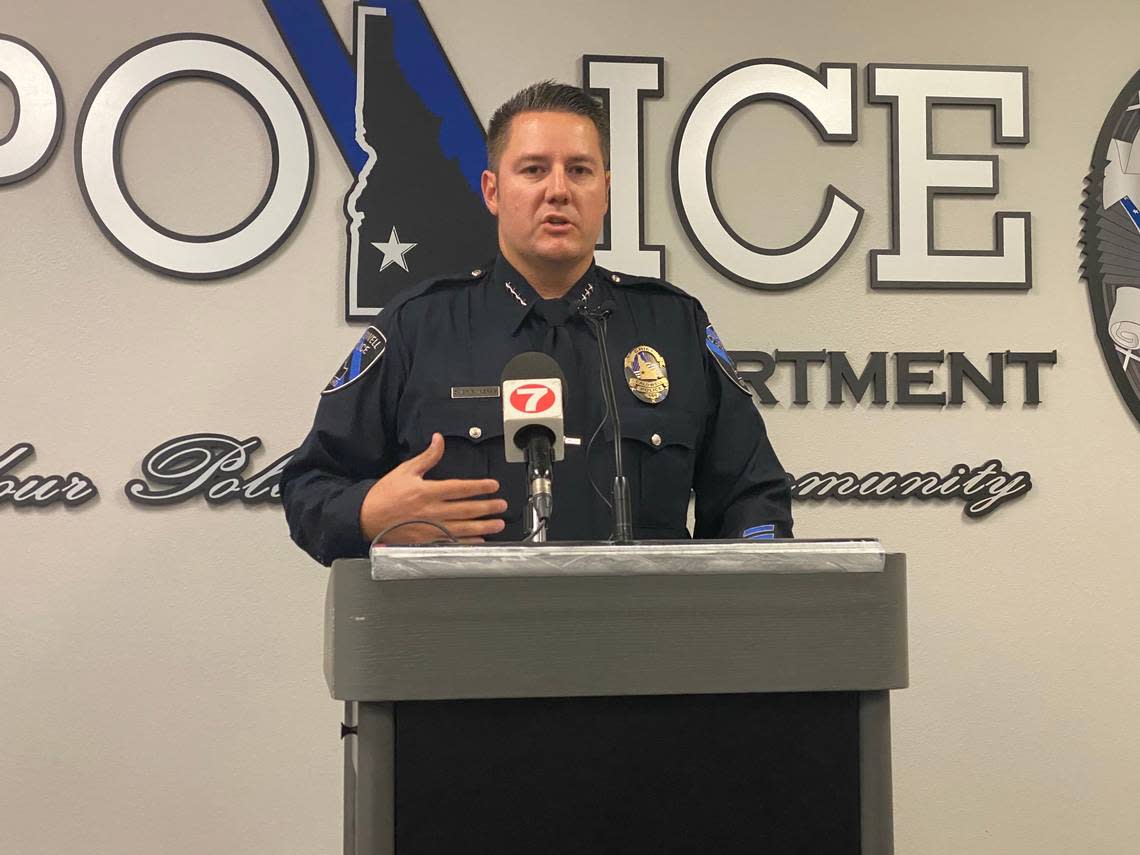
“What I want the community to know is that they don’t have to worry about calling the police to report something and about the officers asking them, ‘Hey, do you have your papers?,’” Ingram said, referring to legal residency documents.
Ingram said that in Los Angeles both the LAPD — where Ingram previously worked — and the Los Angeles Sheriff’s Department don’t work with U.S. immigration authorities either.
“That’s the environment I’m coming from,” Ingram said. “You do your thing, but we’re not gonna assist you.”
How other Canyon County agencies compare
None of the law enforcement agencies in Canyon County have ethnic makeups that fully reflect the Latino communities they serve, according to data provided to the Statesman.
The Canyon County Sheriff’s Office staff is roughly 14% Latino, though Latinos make up 26% of Canyon County’s population.
In Nampa, the police department doesn’t track race or ethnicity data, spokesperson Carmen Boeger said. She estimated that of the department’s 207 employees, roughly 20 to 25 are Latino. Nampa is almost 25% Latino, census data showed.
It isn’t uncommon for the data to be incomplete. In Idaho, it’s up to the individual agencies to collect their own data on how many Latinos work in their departments, as no state agency is collecting the data, according to a report generated by the Idaho Commission on Hispanic Affairs.
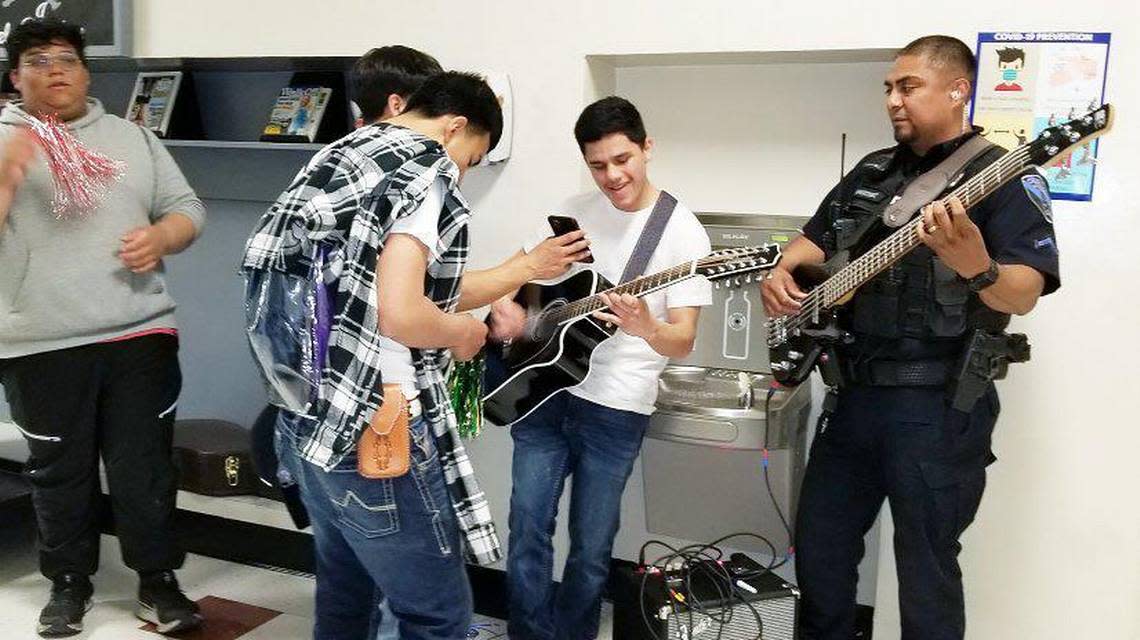
‘You just see the wall breaking’
Ed Moreno, an officer and the Hispanic community liaison for the Boise Police Department, has spent seven years working with the Latino community. After years of speaking Spanish to Latinos who interact with police and interacting with them at events besides police incidents, Moreno said he is finally starting to see a difference.
“When you start interacting with them in their language, you just see the wall breaking,” Moreno said by phone. “Then when you start educating them on our justice system and the services available to them in the department, you start building trust within the community.”
Latinos are underrepresented in Boise’s department too. The department is 3% Latino, while the city is 9%, according to data from the department and the Census Bureau.
When Moreno first started as the liaison, he said he did not receive support from the department’s partners in Canyon County.
“I didn’t really get a whole lot of assistance from our partners in Nampa or Caldwell,” Moreno said. “I’m like, ‘You’re at the epicenter.’ There’s a high concentration of Latinos there with agriculture. That’s where they’re at.”
Today, about 12 officers in the Caldwell Police Department speak Spanish.
Ingram, who speaks Spanish, has done interviews on LaGranD, a Spanish radio station in the Treasure Valley.
“I talked about not only recruiting more Hispanic officers, but really solidifying the relationship that my community needs to have as a police department and be able to trust us,” Ingram said.
Gonzalez, whose state agency hosted the state’s first cultural competency training for law enforcement in 2020, said she hopes Ingram will bring changes to Caldwell. But she said she has been let down for years by Canyon County law enforcement when it comes to following through with Latino community outreach. She said she will believe the push when she sees results.
“I’m more than willing to help them if there really is a genuine interest,” Gonzalez said. “The need is there, but is there a genuine interest?”
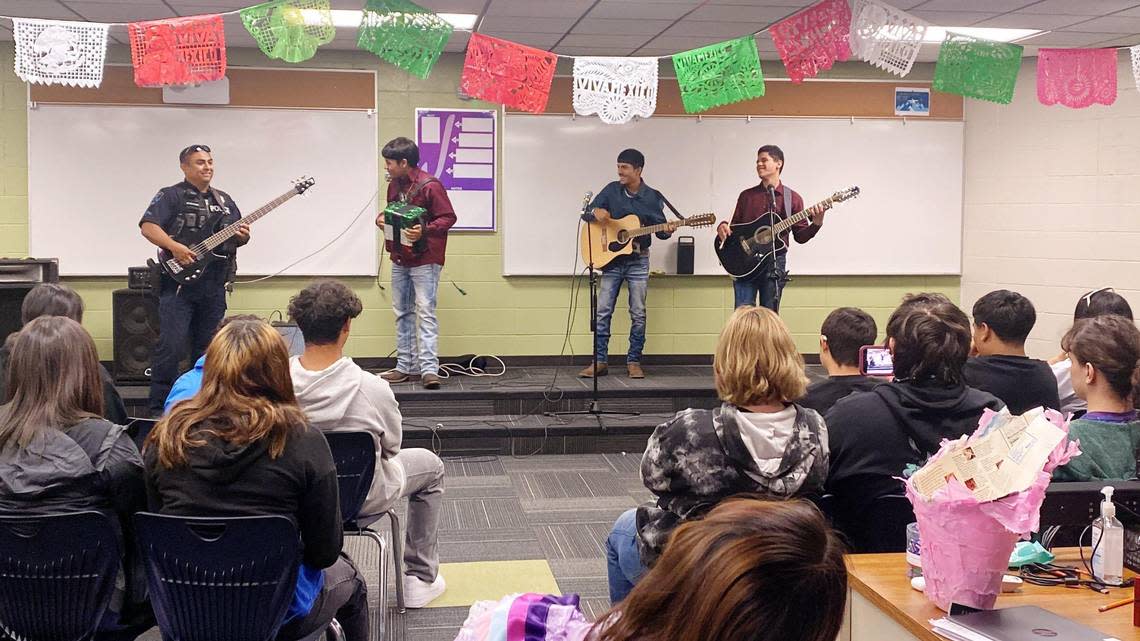
When Martinez first started at the Caldwell Police Department, nearly five years ago, he struggled as one of just a few Latino officers who spoke Spanish.
“When I first started, and throughout the beginning of my career, I was getting tied up with trying to help everybody,” Martinez said.
The department received a couple of applications from people who heard him on LaGranD, Martinez said.
Martinez said he sees the number of Latino officers improving under Ingram.
“I think that will benefit not only (the department), but the community as well,” he said. “Then maybe we can start building that trust again. We need to reflect the population of the community.”
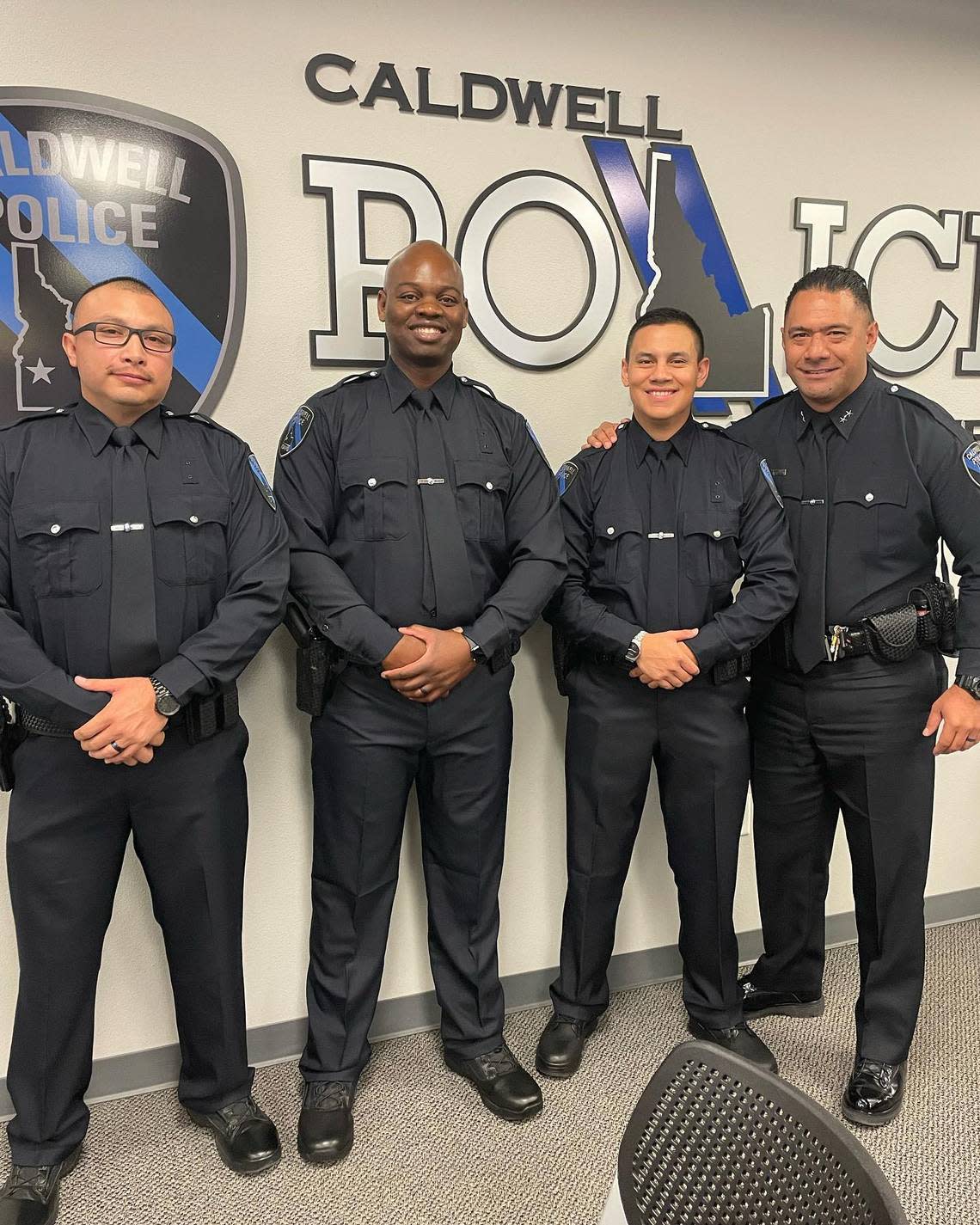
Caldwell police fills four vacancies
Since the Statesman interviewed Ingram in late August, the Caldwell Police Department has hired four people of color, including Deputy Chief Shawn Sopoaga.
Sopoaga, who is Polynesian, joined from the Boise Police Department where he was a lieutenant and worked as recruiting coordinator and watch commander, according to a news release from Caldwell.
“I knew that this guy was something special,” Ingram said on Thursday, Oct. 20 at a Caldwell City Council meeting
Ingram was sworn in as Caldwell Police Chief in June.
The other new officers are Moises Montes, Nilton Melara and Dwight Penkey.
Penkey, who is African American, previously worked for the Ada County Sheriff’s Office as a jail deputy.
Montes and Melara are Latino and Spanish-speaking. Their hiring boosted the department’s Latino makeup from roughly 10% to 14%
Montes previously worked as a deputy with the Owyhee County Sheriff’s Office. Melara worked with the Los Angeles County Sheriff’s Department and then as a correctional officer in the Idaho Department of Correction.
“As you can see, we have a very diverse group of men up here,” Ingram said during the council meeting. “This should be an example (of) my commitment to my community on how diverse this police department is going to become in the near future.”
Former Caldwell police officer found guilty of evidence destruction and witness tampering
Struggling to pay rising prices of produce? This group says immigration reform will help
